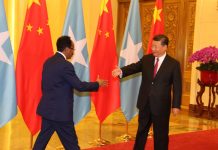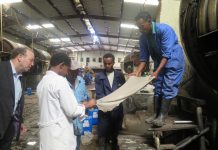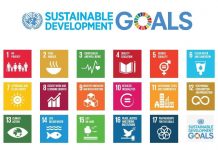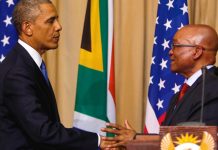The youth in Nigeria and across the continent need to be given a way to channel their energy. Not only do we need training, not only do we need inspiration, we need stories told about the people who have come up with new ideas, who are really driving things forward.
Like William Kamkambwa [of Malawi]. He thought to himself, ‘I have a problem in my village, how do I solve it?’ He went and read a number of books and put together windmills himself, based on all these books that he was reading, to solve this energy problem for his village.
This is the story of creativity that comes from young and driven minds; exactly the sort of story that’s going on all over the continent and that you do not hear enough of. We do not hear enough about the young entrepreneurs who are really making a difference, like these women in South Africa who are extremely good at business even though they do not have MBAs, and in most cases they don’t have university degrees of any kind. They are driving forward the way business works in Africa.
It’s also important that we understand that young people of all different development levels also need to have places to go to learn more. At all levels. People need to have places to go to learn basic human capital development, and to do things like take MBAs and beyond.
So it’s these people who understand some of the things that are going on in Africa, some of the real opportunities in Africa for business and for the youth – for people – to push things forward. It’s people, like the people sitting in this room, who are going to come up with the ideas that are going to drive, not just the private sector forward and not just the public sector forward on the continent, but who are going to drive everything forward into the future, to come up with new and vibrant ideas, new entrepreneurial ideas, and new notions about what could be, both in business and everywhere else.
Now, here’s a bit of a problem with that sort of mindset. I love the energy, I love the entrepreneurship, I love the notion that we can do something right now and very quickly. But a friend of mine has the following joke, which I love. He said, ‘Nelson Mandel wrote this book, which is called The Long Walk to Freedom. But nowadays, the youth, not just in Africa but particularly in Africa, the youth around the world do not want a long walk to freedom, they want a quick sprint to wealth.’
One of the things about being young is, you want to have things happen right now. You don’t think about what’s going to happen in the next 30 years. You think about what’s going to happen by the time you’re 30. And so, at the same time there is this vibrancy, but there’s also impatience.
One of the things that I’d like to encourage you to do is not just to think about what you’re going to do next year, not just to think about what’s going to happen on the continent in the next six months, in the next 12 months, but to take a really long-term view, because it’s your vibrancy, your energy, which is going to build things in the long term. But you have to think in a more long-term way.
Let me show you a couple of things. This is the Porsche dealership in Lagos as an illustration of this interest in the sprint to wealth. But here I’d like to show you a graph which shows GDP per capita in Nigeria, India and China from 1960 to 1980. In 1960, when my family actually first went to Nigeria, it was a very exciting place to go. It was, in a way, almost like the Silicon Valley of emerging markets. If you were young, if you were excited about being in the place of the next big thing, you went to Africa. You didn’t go to India; you didn’t go to China. You went to Africa.
The problem is, in Nigeria what we see is not very much growth between 1960 and 2007. This line is not only flat, but in real terms it means that people in 2007 are not much better off in Nigeria than their parents were, than their grandparents were.
In China, we see tremendous growth. And people often say things like, ‘why is it, or how is it, that a country like Nigeria, that a country like Malawi, that a country like Uganda, who were like China, like Singapore, like some of these other Asian miracles…?’
Well, the first thing I’d like to say is, we don’t actually know the end of this China story. And China is not necessarily growing in a way that is sustainable in the long term. India, for example, is in the middle. And you can sort of think of it, maybe, as a kind of a three- bear story with Goldilocks. One of the lines goes very, very fast and very, very quickly up. And yet, what is going to happen as China becomes more corrupt? What’s going to happen as more and more of these unaddressed social tensions come to the fore? We do not yet know what’s going to happen in China and it could all come crashing down.
Obviously, a relatively flat line is also not what we want from this growth. But maybe this more moderate, less sufficient, but perhaps more stable and more democratic growth, is a reasonable thing to talk about. This India model.
I would like to caution you not to look for an Africa model in this graph. I would like to ask you not to cast about and say, ‘is it Singapore that will work for Africa? Is it Lee Kuan Yew who will work for Africa? Is it China, is it India that will work for Africa?’ Because none of the models will work for Africa.
Africa has to find its own model. And those models of growth, democracy, development; and understanding of how to make things like government legitimate, make things feel fair, make things feel as though they’re moving in the right direction, and can channel Africa’s tremendous energy – those models have to come from Africa. They have to come from people who understand what the problems are; who understand what some of the solutions can be; who are some of the most creative people in the world, in some cases working with the fewest things in the world.
So, let’s go back to China. China is going to face a real demographic problem in the future. So, if we imagine that the future of growth and development, the future of ideas, comes from young people, in Africa, where are these new ideas going to come from? An Africa’s youth that can drive ideas into the rest of the world, from these really creative and very young people.
So, let’s take a moment to step back. Nelson Mandela in 1937 was about 19 years old. I’d like to imagine for a moment the world through a 19-year-old Nelson Mandela’s eyes. What did it look like to grow up under these circumstances in South Africa? What could he expect, what did he think his life was going to look like at the end of his life? He could not possibly have imagined what was in store for him, what was in store for his country, or what he was going to do for his country over the course of his life.
And children in South Africa, in the 1960s, still did not have a sense of what might be to come. And yet, children of this generation, children who grew up at the same time as Nelson Mandela, people who were Nelson Mandela’s age, and Nelson Mandela himself, changed that entire system. And children who sat on the floor and worked hard in schools with no seats and no electricity, and teachers who did not know what was coming next – children would work hard just because they thought they should, not because they thought that they could be president.
Those children ended up being president. They ended up being the people who built the country and who built a new country that many people said could not be built and would not succeed. I think this should be our inspiration.
We do not need to know exactly where we’re going. We do not need to be able to find an existing model or to draw a line from where we are today to where we’d like to be in 2050. What we need to do now is to understand, first of all, that there is tremendous opportunity and that there is tremendous promise. And secondly, we need to understand that the road to exercising that promise and that opportunity is not easy.
It’s not going to be easy, it’s not going to be short. It’s going to require every single one of you to put in tremendous work, to bang your heads against more walls than you’ve ever seen. And the payoff is potentially bigger than you could possible imagine. Not only more work than you can imagine, but better payoff than you can imagine.
Think for a moment about Nelson Mandela at 19. And think for a moment about Nelson Mandela last year. Imagine how satisfying a life that must have been to live. Imagine, at the moment of the end of your life, when you take your last breath, what it is that you have contributed towards. Not how much money did you make; not what positions did you have; not how many Twitter followers did you have, or whatever comes after Twitter.
What contribution did you make and do you have any regrets. I would suggest that the way not only to live your own life, but the way to really contribute to the growth in the continent, the way to push things forward is to think to yourself how can I live a life which will make a big difference and make sure that I have the fewest regrets at the moment when I take my last breath.
Think to yourself what is it that I want to be able to do, what is it that I want to contribute, and what is it that I can still do. Every single person in this room has vibrancy and energy and can really think to themselves, ‘what am I going to do with the rest of my life?’
For those of you who are genuinely young in this room, your job is to have the energy, to have the inspiration, and to make people like me want to get up in the morning and talk to you and ask you, ‘what are you doing, what are you thinking about, what new ideas do you have?’
For those of you like me in the room, who are a little bit older, your job is to provide guidance, to take this energy from people, but also to warn people about the challenges ahead. To tell them the challenges that you faced and how you dealt with them, not because they’re going to do all this in the same way, but because we can all learn from other people’s experiences.
And for some of the people in the room who are perhaps a few years older than me, you have wisdom. And you have seen more things than anybody else in this room has seen. And you understand some of the problems that could happen, but you’ve also seen tremendous exciting things in your life. And you can provide inspiration when things get hard, the understanding of history but also the understanding of what’s to come, and the fact that no one can adequately anticipate what’s going to happen in their lives or in the world.
Nelson Mandela said, “What counts in life is not the mere fact that we have lived. It is what difference we’ve made in the lives of others that will determine the significance of the life we lead.”
That doesn’t mean that you can’t go out and do business. Actually, quite the opposite.
In my opinion, Africa is going to be driven forward by the private sector, by individual efforts. It does not mean that you cannot make money. It does not mean that you cannot have a comfortable life. It does not mean that you cannot succeed in the way that you want to succeed.
What it does mean is, number one: you have to think about the gains that are going to last, not just about the gains that are going to come immediately. And number two, you have to think to yourself, ‘how do gains that I am making going to contribute to the overall gains?’
And if we can all think that way, we can all coordinate and make sure that we are building something together. Then the thing that we have built will not only last, not only be stronger, but it will be bigger, better and more satisfying for all of us. At that moment, when we are lying on our deathbed, taking our last breath, and thinking to ourselves, ‘I am happy with what I did with my life.’
Catherine S. M. Duggan, Ph.D., is an assistant professor in the Business, Government and International Economy (BGIE) unit of Harvard Business School. Her research examines financial-sector regulation and contract enforcement in developing countries, with a focus on sub-Saharan Africa. The above Commentary is the presentation she gave in a private Executive Education session for sponsors, panelists and moderators at the 16th Annual Africa Business Conference hosted by the Africa Business Club, a member of Student Clubs of Harvard Business School, Feb. 28-March 2, 2014.













